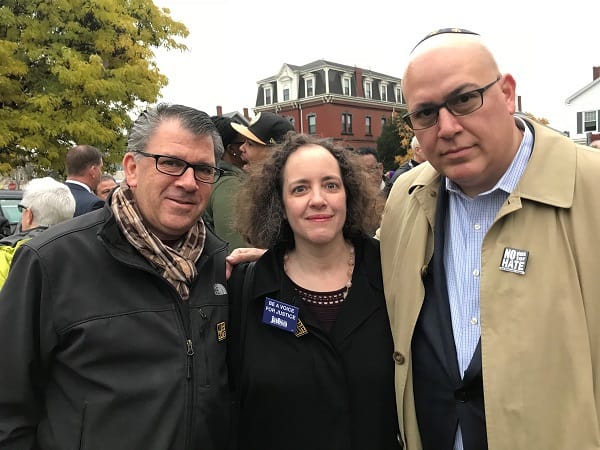It’s a bit of a “bad joke” amongst certain political and interfaith partners of ours that if we are gathered more than twice in one week it has been a bad week. This past week has been a really bad week.
Like all of you, I was shattered last Shabbat by the news out of Pittsburgh.
And, on Saturday night, I was struck by the immediate outpouring of love and support from partners and allies outside the Jewish community. The director of a mosque already reaching out to several rabbis before noon on Shabbat offering support “in any way.” The African Methodist Episcopal minister who, before we had even made Havdalah, emailed to tell us how our community’s solidarity with his following the church massacre in Charleston three years ago was seared in his memory; that what helped was to know that they “were not alone” and that “we will come at any time and in any way to support you.”
And there were texts and calls from public officials – some to me, many more to others who described them to me – the governor, the mayors, police commissioners, legislators, their aides; all offering help, all wanting to make sure we knew that they were ready with whatever our community needed in this moment.
Hearing these messages brought clarity; we needed to make sure that the experience of being held in love and support by the broader community would not be limited to a small circle of Jewish communal leaders. We needed to make sure that all of our community could be held by these folks; because our grief is not the private reality of rabbis and CEOs but of all of us, every single member of a community reeling in the aftermath of this unthinkable slaughter.
So we tapped into our network of member agencies, each with key relationships and unique competencies. Within hours, we had announced a vigil for Sunday afternoon on the Boston Common, and quickly had commitments from a broad array of the state’s leading public and faith figures. They stood wall to wall with us on Sunday. Their messages were heartfelt; understanding our pain, denouncing the hate motivating the attack and offering strength as we struggled to cope with the weight of events.
They invoked profound relationships: Cardinal O’Malley spoke of the partnership between our communities in supporting immigrants and refugees. They understood us and our fears: Shaykh Yasir Fahmy urged us to keep wearing our Judaism proudly and publicly, to “hold our yarmulkes tighter” just as he would tell his own youthful congregants to “hold their hijab closer” after an experience of Islamophobia. And with gentle and loving insistence, they challenged us to be with them as well, as Rev. Liz Walker did when she invited us to be in partnership with her community in Roxbury as it deals with ongoing and almost daily acts of violence.
Sunday was a beginning toward healing and also a reminder – we haven’t and won’t be facing violent anti-Semitism alone. And it was an invitation, made all the more resonant as we were reminded often this week – by the murder of a black couple in Kentucky last week, and then on Wednesday with the racist graffiti as Tynan School in South Boston – to be present in the struggles of our neighbors as well, as this country grapples with the toxin of hatreds targeting all of our communities.
The power of Sunday on the Common didn’t “just happen,” and it certainly didn’t happen in just a few hours on Saturday night. It was made possible through years of investment in relationships by the network of JCRC members. We have built deep and enduring ties with our interfaith partners on matters of common concern, while engaging in honest and challenging conversations about areas of tension and disagreement. We rolled up our sleeves to work with our friends in the state house over decades to advance our values and work together for the better good of the commonwealth. We heard “yes, of course I’ll be with you” from every partner we reached out to on Saturday night, because, for years, our community has invested in the urgent necessity of community relations.
And this morning I joined leaders from ADL New England and JALSA, along with many of those same faith and community leaders, at the Tynan School to show our support for our neighbors and to stand with them against hatred here in Boston. We stood together because we all need to be held and we all need to hold each other in these times if we are going to find a way forward as a nation.

And as we enter this first Shabbat after Pittsburgh, we will again see many of those partners in shul this weekend. I am heading off to services tonight joined by so many of our friends who are joining Jews around the world to #ShowUpForShabbat.
The problem and the threat of violent anti-Semitism isn’t going to be solved overnight. And it is deeply intertwined with a larger challenge of violent and hateful extremism that threatens not only the Jewish community but all Americans – as members of threatened communities and as stakeholders in a nation being threatened by the normalization of hatreds.
So yes, seeing our partners so often means it has been a very bad week. But it has also been a week filled with hope – because they’ve shown up for us and we’ve shown up for them. Together we are finding the resiliency to move forward, stronger together and ready to do the work we do every day of holding community and communities in partnership.
Shabbat Shalom,
Jeremy




